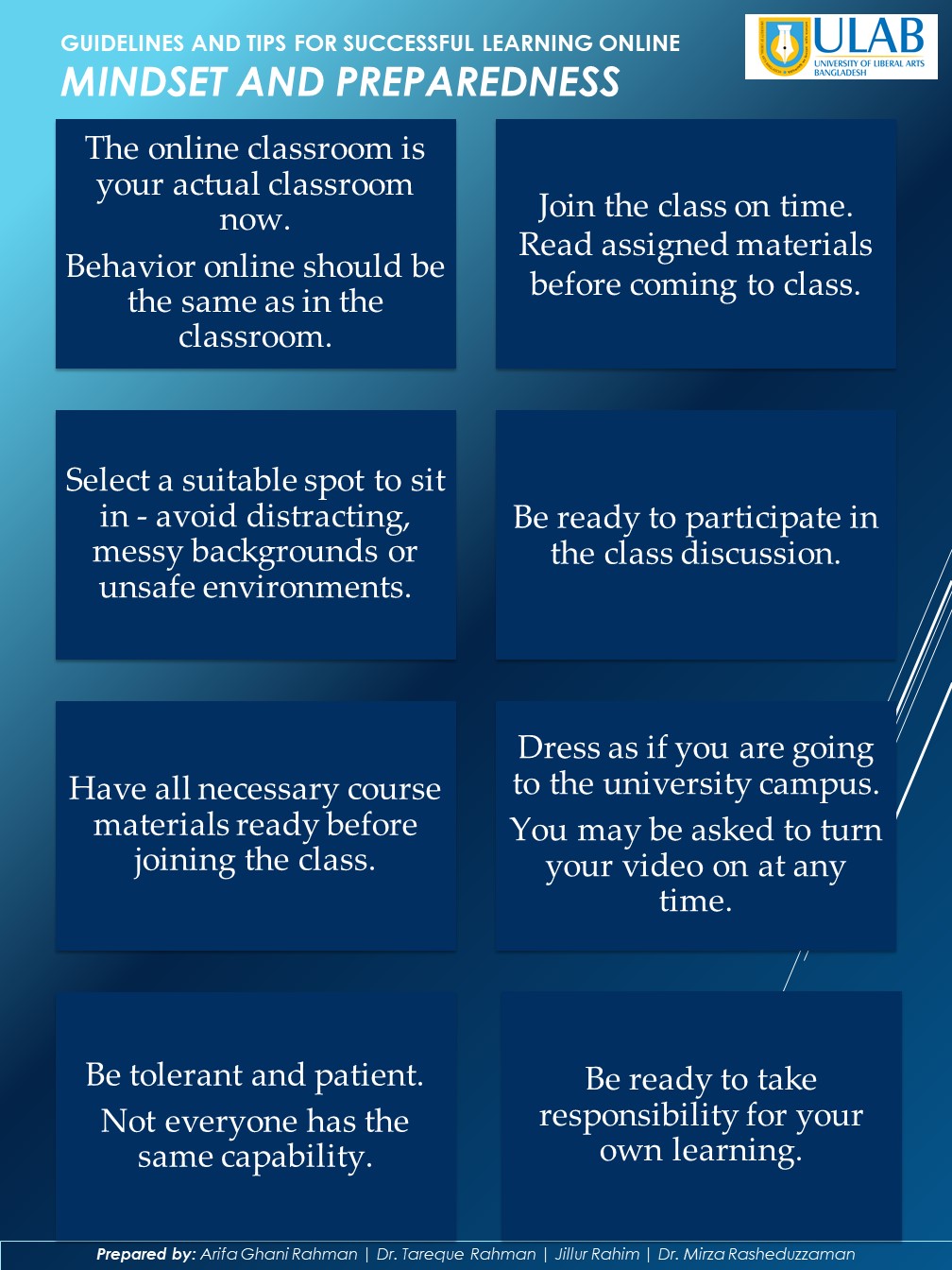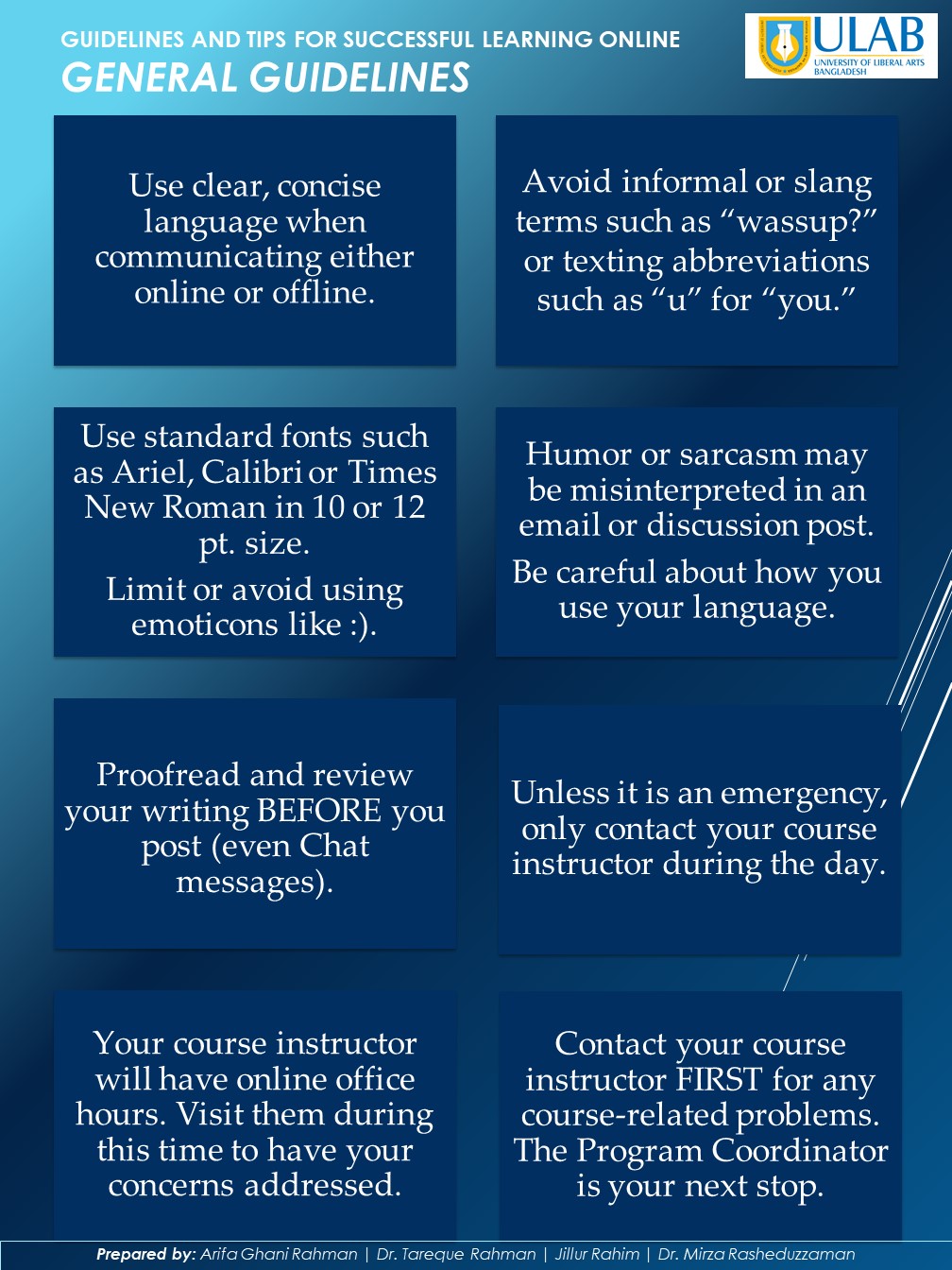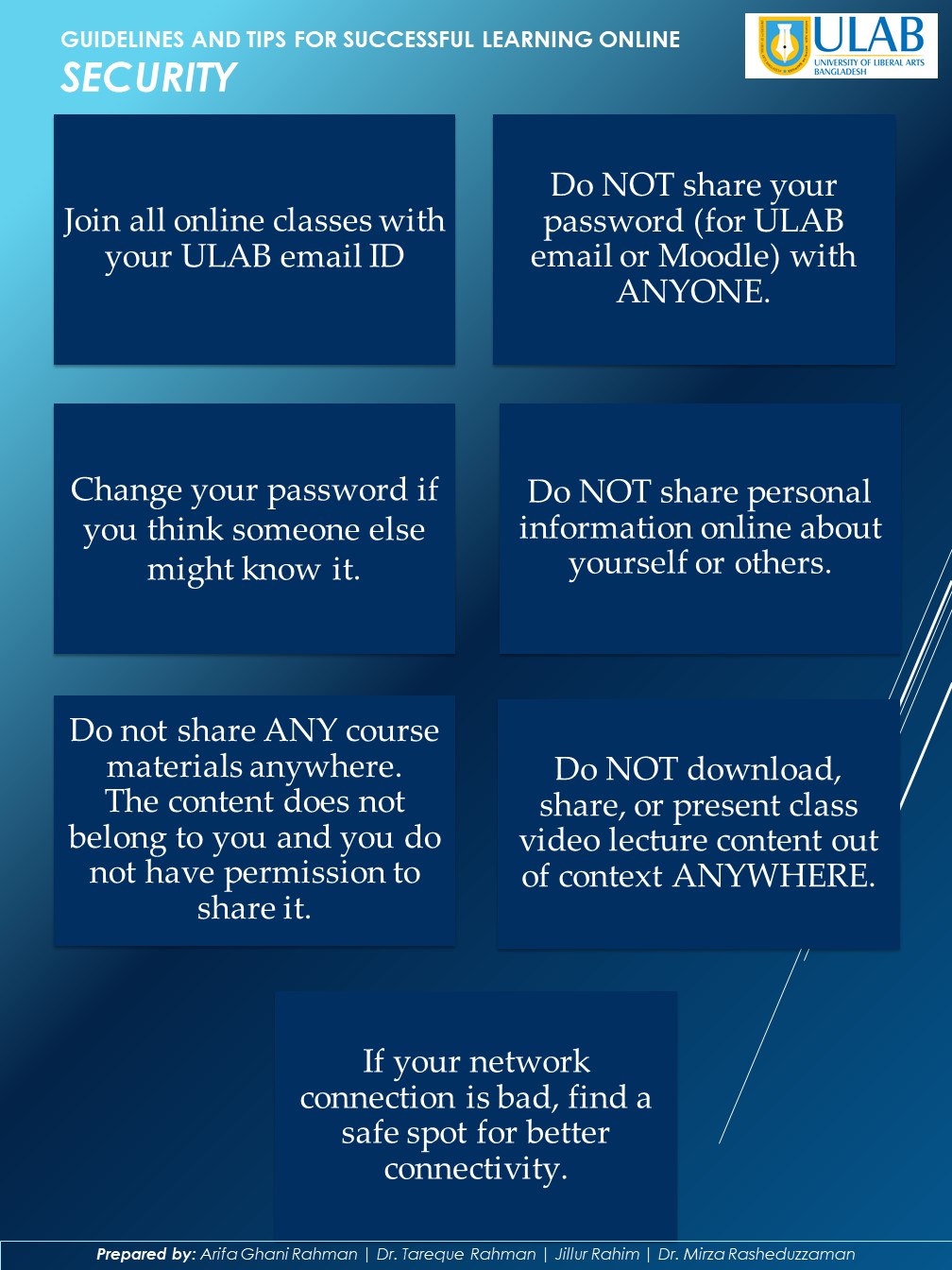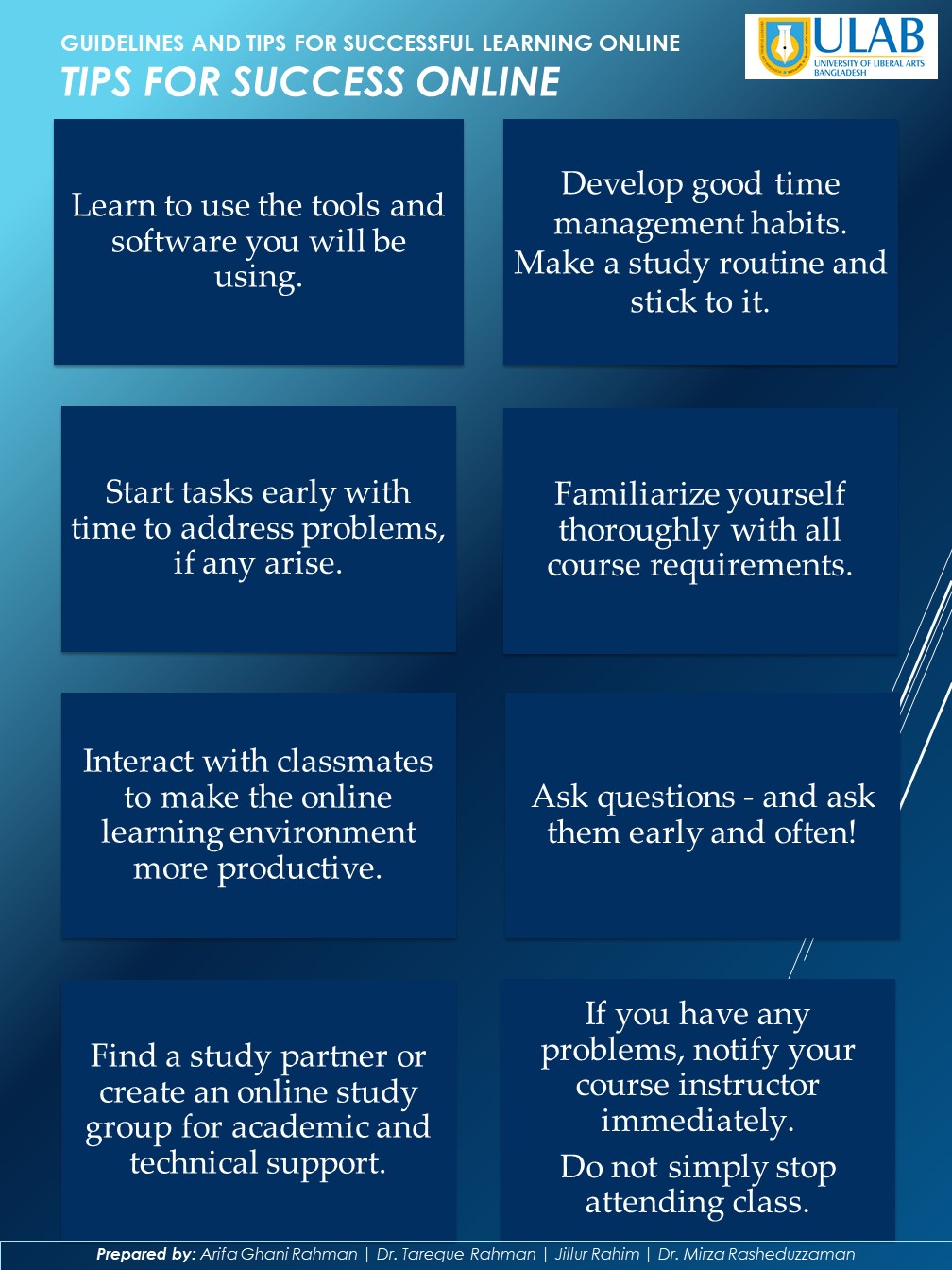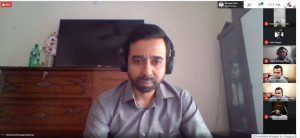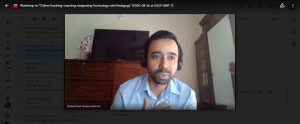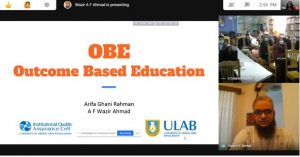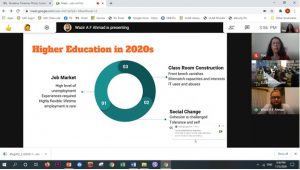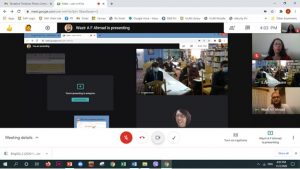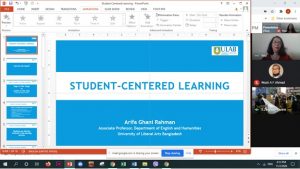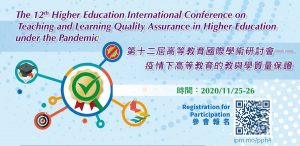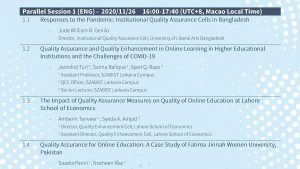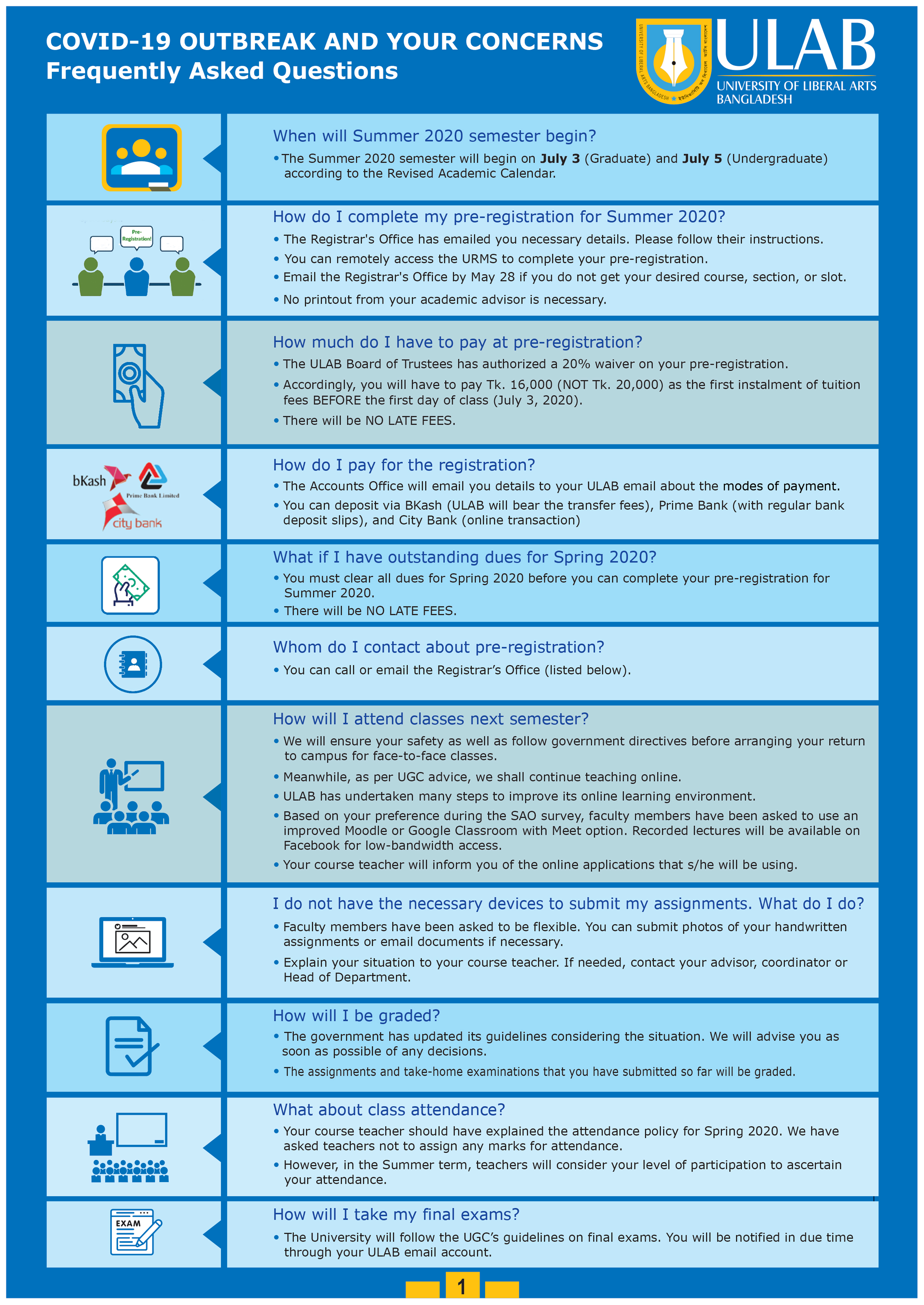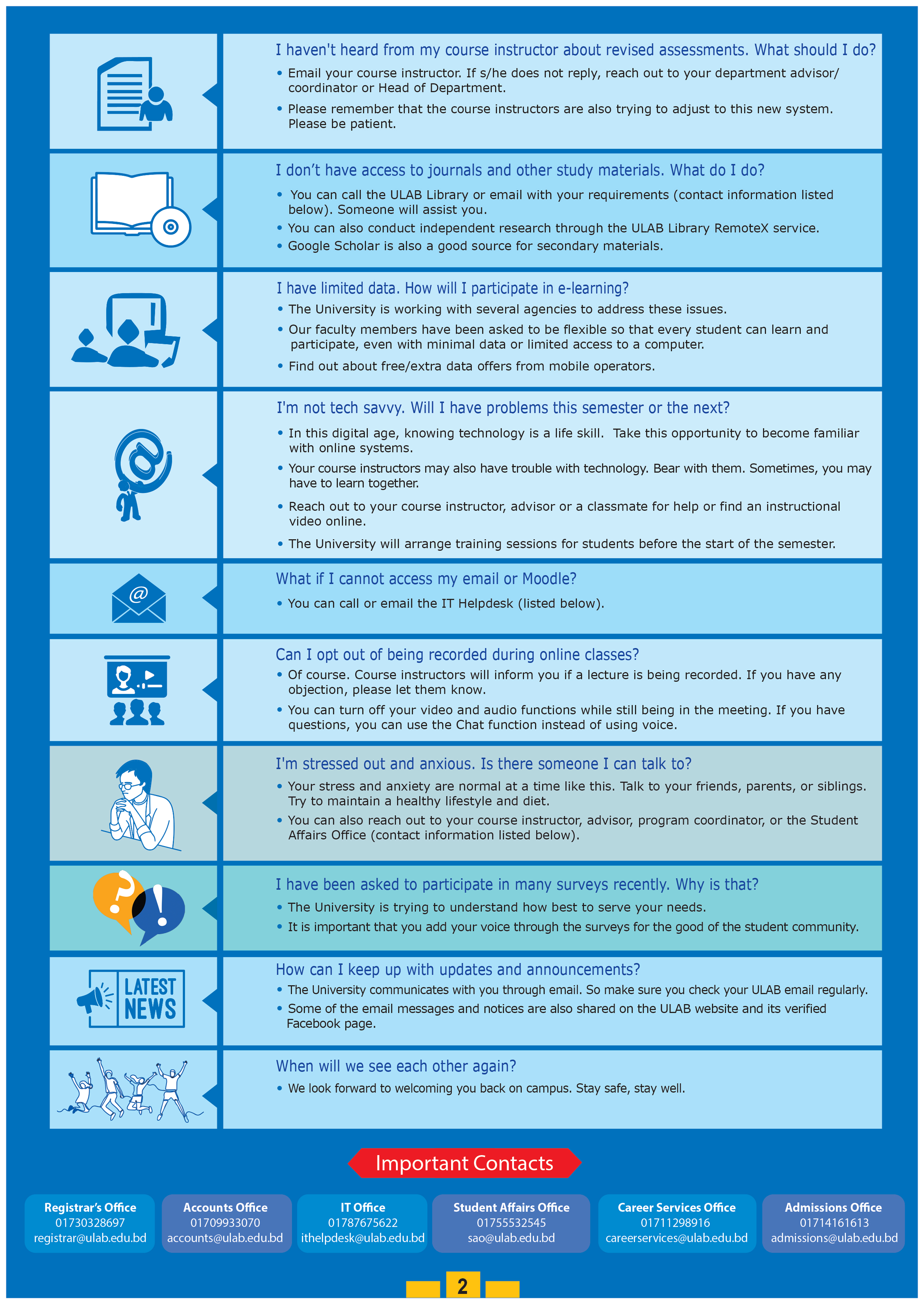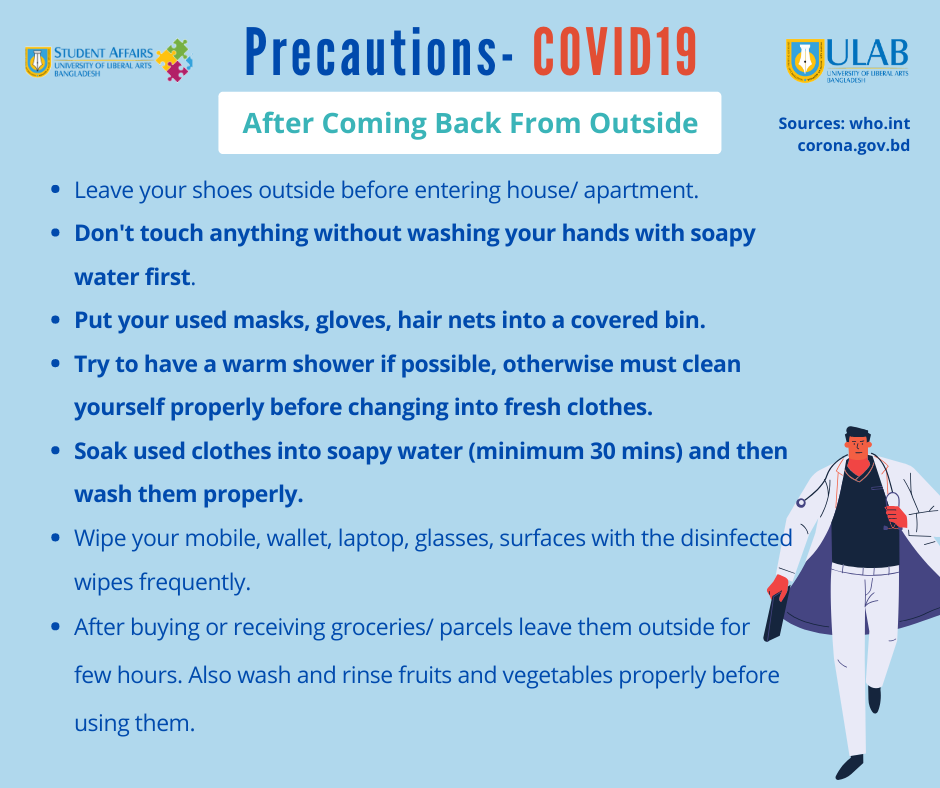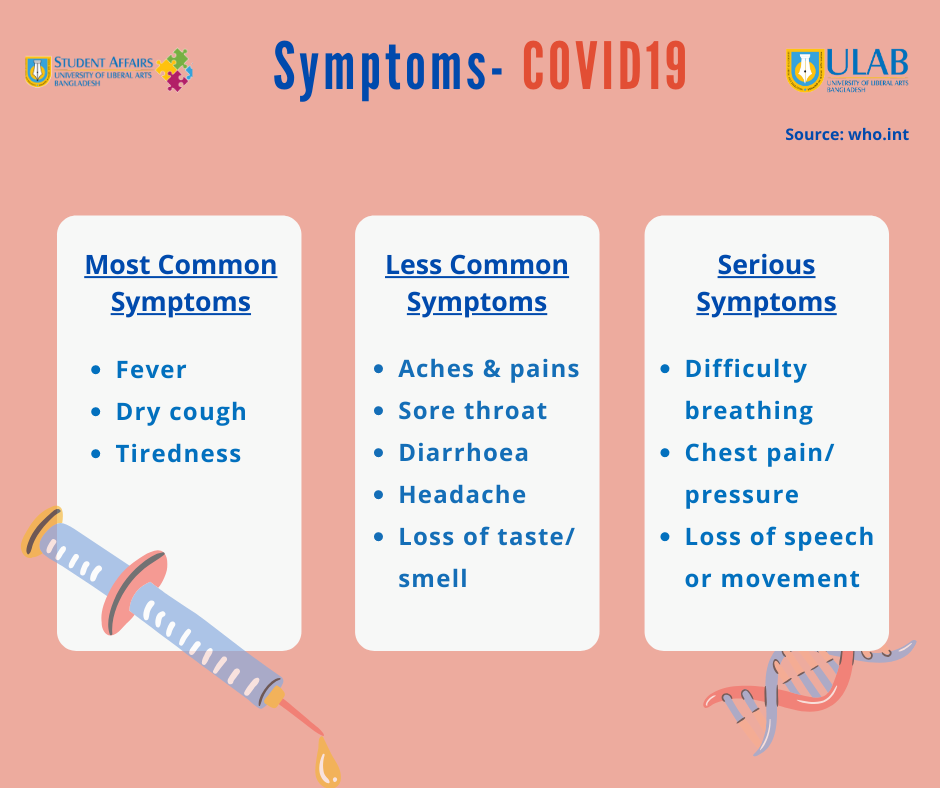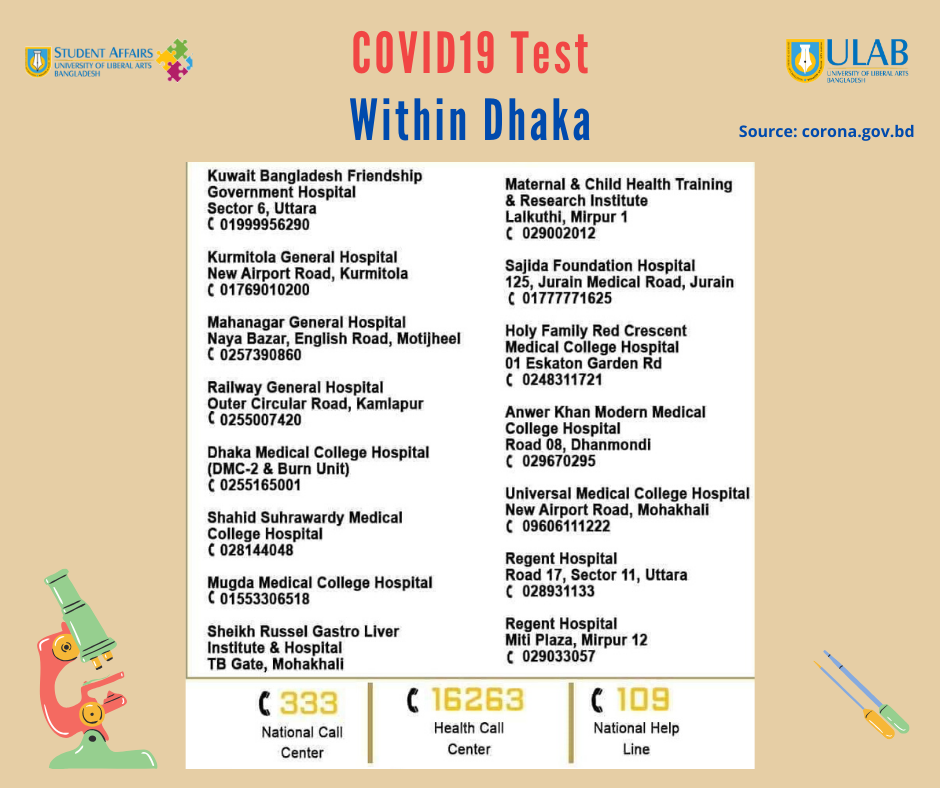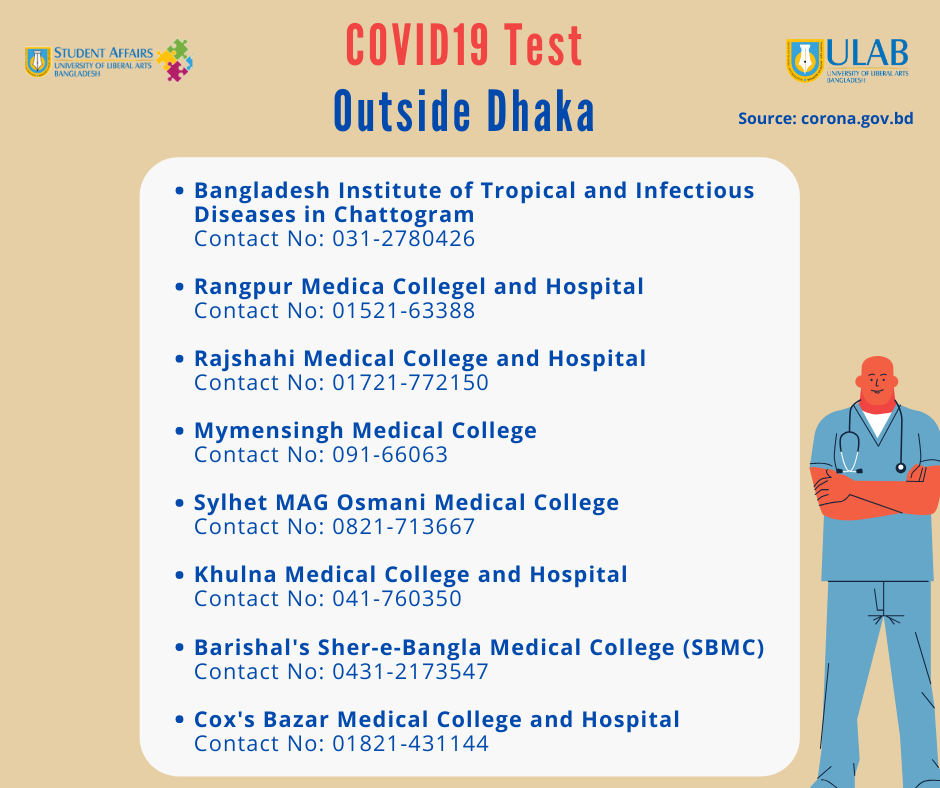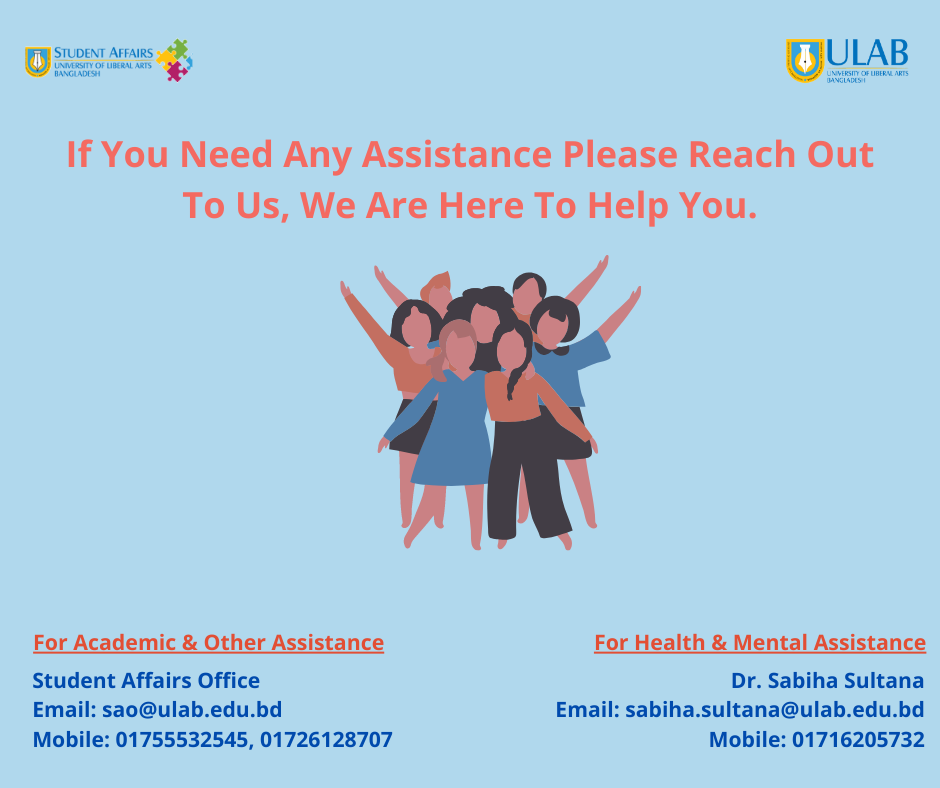COVID-19 RESPONSE
-
Shifting to Full Online Teaching: The ULAB Experience
Shifting to Full Online Teaching: The ULAB Experience
On 16 March 2020, amidst fears related to the coronavirus outbreak, the Bangladesh government issued a directive decreeing all educational institutions under the Ministry of Education to close from 18 to 31 March. Later, in the wake of an increasing number of deaths and confirmed infections, the Ministry of Education extended the school closure – first from 31 March to 9 April and again from 9 to 25 April. To minimize possible academic losses, the University Grants Commission (UGC) declared on 23 March that all universities introduce online education to run academic activities. It likewise suggested use of the Zoom Application, which can be accessed under the license of the Bangladesh Research and Education Network (BdREN).
In light of all these directives, the University of Liberal Arts Bangladesh (ULAB) authorities officially announced on March 16 the shift to online learning. At this time, the university was in the first half of the term with the mid-term period scheduled to take place in the last week of March. The authorities also instructed faculty to give assignments, written take home exams and viva voce exams in lieu of synchronous online written examinations. The authorities had to think of online teaching and assessment strategies given the levels of Internet accessibility of its students. Based on a recent survey administered by the university’s Student Affairs Office (SAO), 60 percent of the students had reliable Internet access, 30 percent had intermittent Internet access, and 10 percent had no Internet access. The students without Internet access could not participate in the online sessions and therefore, special policies needed to be formulated and executed once the lockdown is lifted. For now, the university needed to focus on students falling in the first two levels.
It should be noted that based on a Quacquarelli Symonds Limited (QS) survey conducted among 16,000 students and 400 university administrators, 54 percent of university respondents have shifted to online teaching and 63 percent of student respondents expected their universities to move towards teaching online. The data were gathered from February to March 2020. ULAB is only one of the several universities that have shifted to full online teaching due to the pandemic. Most ULAB students likewise expected the university to move to full online teaching.
ULAB Profile. As of Spring Semester 2020, the university has 4,477 undergraduate and 662 graduate students. It has four schools – School of Business, School of Arts and Humanities, School of Social Science and School of Engineering. The university has 187 full-time and 155 part-time faculty members. More than one-third of its full-time faculty have doctorate degrees.
ULAB is a private liberal arts-based University located in Dhanmondi, Dhaka City. Founded in February 2002, it was granted permission to open from the UGC in November 2003, pursuant to the Private University Act 1992. ULAB was formally launched at a ceremony on 1 October 2004. ULAB believes in developing young minds to their fullest potential through the free and creative pursuit of knowledge. It is firmly committed to helping young men and women to become responsible and caring citizens of their nations and the world. ULAB fulfils these aims by adopting an array of traditional and innovative academic and extracurricular programs, and by bringing to its students the best that has been thought and accomplished in the arts and sciences throughout the world.
Foundations in Online Teaching. ULAB authorities started floating the idea of the learning management system, or LMS, Moodle, during the Spring Semester of 2014. Moodle is a free and open-source learning platform designed to provide educators, administrators and learners with a single robust, secure and integrated system to create personalized learning environments. It is used for blended learning, distance education, flipped classroom and other e-learning projects worldwide.
After obtaining approval from the ULAB Syndicate, the late Prof. Brian Shoesmith (then Dean for Academic Development) announced in February 2015 the official adoption of the Moodle Learning Management System. Training, however, had begun from Spring 2014 with those faculty members who were interested and willing to experiment. Prof. Shoesmith assigned Arifa Ghani Rahman, currently Associate Professor of English and Humanities at ULAB, to conduct the training as she had many years of experience in teaching online. Prof. Shoesmith made it clear, when Moodle was officially adopted, that the platform would serve as an additional support to teaching and “not as a replacement for classroom teaching.” The system has since been used as a supplement to teaching where teachers can upload helpful or additional course materials, distribute and collect assignments, record grades, take attendance, chat with the students, and so on.
Official completion certificates in Moodle training were given to faculty members from April 2015. By February 2016, around 90 percent of the faculty had been trained in Moodle. As shown in a survey on Faculty Usage of Moodle, many teachers had made use of the system to complement their physical classroom teaching. However, they found it more convenient to communicate with students using other online platforms such as Facebook messenger or groups when off-campus.
In September 2018, ULAB formed an Online Education Study Group to recommend measures on how to move forward with online teaching and learning at the university. The group suggested the following strategic directions:
- Assess the impact of online education practiced at ULAB and in other universities;
- Prioritize online education strategies that build upon the strength of a liberal arts university;
- Limit online education engagements to those instances that yield clear benefits to students and relevant stakeholders; and
- Undertake broad consultation with faculty regarding online learning strategies.
Given these, various departments and centers in the university have made inroads in conducting online learning. Much of these have been instrumental in facilitating the shift from face-to-face classroom to online class teaching during this time of the pandemic. However, the familiarity with an online LMS among faculty and students could be considered the most important factor in facilitating this shift.
Inclusion of Other Learning Platforms. ULAB authorities have specified Moodle as its main online learning platform. However, to complement Moodle, authorities encouraged faculty to utilize other online platforms to facilitate teacher-student interactions. The goal of this directive was to prioritize the delivery of the course content, rather than focus on the platform used. For video conferencing, the faculty has utilized Zoom, Google Meet, and Google Hangouts. For speedy communication with students, faculty use WhatsApp and Facebook groups or Messenger. For students with intermittent access to Internet, faculty have uploaded documents and other materials to Moodle, and to Google Docs, Facebook groups, or sent them via email. Some faculty have recorded their synchronous lectures and uploaded them to the course-related Facebook private group so that students who could not login for any reason could view them later.
Collaboration with Coursera. Back in 2018, the MBA Program Director Asif Uddin Ahmed, in his Integrated Marketing Communication course (MKT505), asked his students to register for a course offered jointly by Edx.org and Curtin University of Australia called “Digital Branding and Engagement.” The course was free unless the students wanted a certificate from Curtin University. Finishing this course carried 20 percent of the assessment grade in the course MKT505. At the end of the course, Edx.org sent the result directly to the teacher.
From the success of this initiative, Asif wanted to make available to ULAB students more online courses. In April 2020, he announced that Coursera has agreed to offer more than 4,600 courses for 1,000 ULABians for free for the next six months. Coursera is an American online learning platform founded in 2012 by Stanford Professors Andrew Ng and Daphne Koller that offers massive open online courses, specializations and degrees. The agreement with Coursera is beneficial not only to business students but to all ULAB students and faculty, especially for those who want to learn more during the lockdown.
Conducting Webinars. In 2018, the Center for Enterprise and Society (CES) and EMBA Program Director Sajid Amit initiated a partnership with the Startup Dhaka Online School (rechristened as “Upskill”). The partnership allowed CES/EMBA program to acquire experience and capability in developing online learning content. With this experience, the EMBA program facilitated two webinars. The first webinar was conducted via Zoom on 5 April. Facilitated by Sajid, it covered the COVID-19 situation in the country and how to cope with it professionally and mentally. The second webinar, also held via Zoom on 13 April, was entitled “Impact of COVID-19 on Startups of Bangladesh.” The following panelists participated: Tina Jabeen (ICT Division, GoB), Fahim Ahmed (Pathao), Maksudul Islam (Shohoz) and Rubaiyath Sarwar (Innovision Consulting).
The Media Studies and Journalism Department conducted the following webinars during the lockdown period:
- PR Project Planning and Implementation. 2 April. Iffat Nowrin Mallik (Instructor)
- Basic and Advanced Cinematography. 21 March. Asraful Alam Rubel (Instructor)
- Basic Learning of Adobe Premiere Pro. 19 March. Ishtiaq Ahmad (Instructor)
- Covering Live Events. 2 April. Manwar Hossain (Instructor)
Two more webinars are planned this month. School of Engineering Assistant Professor, Dr. Nafees Mansoor will conduct on 23 April a tech talk on “The Art of Clean Code.” Media Studies Senior Lecturer Muhammad Aminuzzaman, together with Instructor Mohammed Mozammel Huq Tetu, will hold via Zoom a Basic Photography course on 17 and 18 April.
e-Learning Faculty Facebook Group. During the lockdown, a Facebook group called eLearning Experience of ULAB Faculty was established to serve as a platform where faculty can exchange notes regarding online teaching and learning. In this group, faculty narrate their experiences in transiting to online teaching. They also present their practices with regard to student management, assessment, pedagogy, course syllabi writing, online learning platforms, cyber security and other concerns. In a sense, the platform is a community of practice. So far, 74 full time faculty (from the four schools and General Education Department) have joined the group.
Online Class Accomplishments and Further Improvements. The University has achieved great success in transiting online. Based on the 10 April Institutional Quality Assurance Cell (IQAC) Report, there were a total of 520 required midterm exams across the various academic departments. Of these, 99.6 percent were completed. Moreover, there were a total of 2,799 required online classes. Of these, 83.7 percent were held. The University authorities have declared 13 April as the last day of classes for Spring 2020.
Since this is the first time the University has conducted full online teaching, it needs to gather data in order to examine ways for improvement in the future. Herein, the university has adopted three strategies.
First, through the SAO, it is gathering initial feedback from students regarding the conduct of their online courses.
Second, through the Center for Excellence in Teaching and Learning (CETL), it is surveying its faculty regarding their physical wellness, psychological wellness, financial wellness, online class response, and support needed to improve online class response.
Third, the IQAC has requested students to complete their course and teacher evaluations online through the University Resource Management System or URMS. Every term, faculty are evaluated in terms of subject matter knowledge, teaching pedagogy, learning assessment, professional behavior and student development. Courses are investigated in terms of content/organization, learning environment, learning resources, teacher contribution and student contribution.
From the results of these feedback systems, ULAB’s practices relating to online teaching and learning will improve in the future.
-
Student Support Programs and Events
Pohela Boishakh (14/4/2020): https://www.facebook.com/125162620861384/videos/1530343970475380
করোনা ভাইরাসের প্রাদুর্ভাবে দৈনন্দিন ব্যক্তিগত এবং সামাজিক জীবনের পাশাপাশি মানসিক স্বাস্থ্য (6/5/2020): https://www.facebook.com/125162620861384/videos/2563439197241924
Learn How to Relax (14/5/2020): https://www.facebook.com/125162620861384/videos/235750027697470
Eid Greetings from the VC (26/5/2020): https://www.facebook.com/125162620861384/videos/549775002570878
Job Market Realities of Bangladesh During and Post Covid-19 (14/6/2020): https://www.facebook.com/125162620861384/videos/265371244675561
Mental health care of the young adults during the Covid Crisis and Beyond (25/6/2020): https://www.facebook.com/125162620861384/videos/1061950100905867
Physical well-being during COVID-19 (29/6/2020): https://www.facebook.com/125162620861384/videos/295175388292646
Summer 2020 Freshers’ Orientation (1/7/2020): https://www.facebook.com/125162620861384/videos/192902185477719
Summer 2020 Freshers’ Orientation 2nd Day (2/7/2020): https://www.facebook.com/125162620861384/videos/708673716634568
Reformation of HR Policies in Various Industries and Expectations from the Graduates (12/7/2020): https://www.facebook.com/125162620861384/videos/282859219460370
Preparing for Future Job Market in ICT Sector (16/7/2020): https://www.facebook.com/125162620861384/videos/199895441457018
Start Up Opportunities in ICT Sector (18/7/2020): https://www.facebook.com/125162620861384/videos/275853193719488
Student Mental Well-being During this Pandemic (26/7/2020): https://www.facebook.com/125162620861384/videos/761580851051115
An Eid of a Different Kind: Stay Close While Staying Apart (1/8/2020): https://www.facebook.com/125162620861384/videos/566059124089889
Mental Health Care during COVID and Beyond (23/8/2020): https://www.facebook.com/125162620861384/videos/2758676944422068
How to Ace Corporate Interviews?(5/9/2020): https://www.facebook.com/125162620861384/videos/3747522518610996
How to Make Your CV Stand Out? (12/9/2020): https://www.facebook.com/125162620861384/videos/766705520817726
Career Vision for the Future Generation During the Global Pandemic of Covid 19 and Beyond (12/9/2020): https://www.facebook.com/125162620861384/videos/725087111407688
Prospects of Job Market due to Global Pandemic: Opportunities and Threats (16/9/2020): https://www.facebook.com/125162620861384/videos/763403887782572
Mental Wellbeing: Sexual Harassment and Cyber Bullying (23/9/2020): https://www.facebook.com/125162620861384/videos/352676332843052
-
Training (E-learning Committee)
The E-learning Committee was formed by the Vice Chancellor to oversee the process of transition from face to face to full online teaching/learning. The committee is responsible for conducting/organizing training sessions for the faculty members and provide any necessary related support to them.
The Committee formally came into effect on April 30, 2020 and remains in effect until further notice.
Prior to the formation of this committee, an interim emergency committee had been functional since March 10, 2020.
Members
Ms. Arifa Rahman (Chair), Dr. Tareque Rahman, Dr. Mirza Rasheduzzaman, and Mr. Jillur Rahim
Recommendations
- DEH, USB, Engineering School, GED, CLS and CSD will use Google Classroom, and MSJ will use a combination of Moodle and GC.
- Faculty who have been consistently using Moodle will continue to do so if they choose, regardless of department choice. A revision workshop will be conducted by Arifa Rahman.
- Google Classroom and Moodle will be the only two official platforms for teaching and course material dissemination.
- For video conferencing, all faculty will use Google Meet (to minimize the number of tools used across the university).
- While we teach with Google Classroom and Moodle’s current version, IT will work on upgrading Moodle on a separate test server to avoid disruptions.
- Training will be mandatory for all faculty members.
- Orientation/basic training on Google Classroom must be conducted for ALL students (how to login, how to access documents, how to submit assignments, how to take quizzes, etc.). This will be done by departments for their students due to the limitations on participant numbers on Meet.
- During the training session, both the instructor and student interfaces will be shown.
- Training sessions may be recorded for future use or sharing.
- If a faculty member chooses to use Moodle, they must commit to conducting the training for the students in their course.
- Departments may choose to upload recorded synchronous meetings to PRIVATE Facebook course groups, YouTube, or other low bandwidth spaces.
- Whatsapp, Messenger, and other apps may be used for informal communication purposes ONLY.
- Faculty members who are teaching different sections of the same course should collaborate/coordinate to ensure similar workload/assignments.
- Faculty will hold a DEMO class on the first day to familiarize students with the platform and contents. They will also poll students on their internet connectivity and accessibility to devices.
Training Sessions
Agenda
Activity
Date of Activity
Resource Person
Training
Training to Admission Office
23/7/20
Arifa Rahman
Tareque RahmanGoogle Classroom Training: USB
10/5/20
Jillur Rahim
Google Classroom Training: DEH
12/5/20
Jillur Rahim
Google Classroom Training: SSE
11/5/20
Mirza Rasheduzzaman
Moodle Training: MSJ
17/5/20
Arifa Rahman
Google Classroom Training: GED/CLS
13/5/20
Jillur Rahim
Moodle Revision Workshop
14/5/20
Arifa Rahman
Follow up/Troubleshooting
USB
— Jillur Rahim
DEH/CLS
21/6/20 – Session 1
25/6/20 – Session 2
29/6/20 – Session 3
Also provided troubleshooting support twice a week for the first 3 weeks of class
Arifa Rahman with DEH committee members
SSE
— Mirza Rasheduzzaman
MSJ
— Arifa Rahman
GED
25/6/20 Tareque Rahman
Student Orientation/Training
Central
1/7/20
Arifa Rahman
USB
— DEH
2/7/20
Arifa Rahman
SSE
30/6/20
Shameem Hasan
MSJ
MSJ faculty
GED
Tareque Rahman
Awareness Posters
Poster information
Arifa Rahman
Jillur Rahim
Tareque RahmanPoster feedback
Tareque Rahman
Mirza RasheduzzamanPoster design and dissemination
Arifa Rahman
Thesis Presentation Orientation
DEH
31/5/20
Arifa Rahman
Others
DEH (Online assessment strategies)
30/7/20
Arifa Rahman
Towhidul Islam KhanActed as the Chair of the Department wise online teaching-learning committee and organized two training sessions for the academics
Tareque Rahman
Recorded a student orientation video for the GED faculties to orient them student training on GC.
Tareque Rahman
Sharif Ahmed
-
Training & Outreach (Center for Excellence in Teaching and Learning)
The Center for Excellence in Teaching and Learning (CETL) at ULAB was instrumental in conducting trainings, talks, webinars, and workshops at ULAB as well as institutions outside ULAB.
May 18, 2020
- A training session on “Online Teaching-Learning Pedagogy in an Emergency Context” was conducted by three education experts from Education University of Hong Kong, Monash University, and Green University to discuss various pedagogical issues and strategies for successful online teaching.
Video Link https://drive.google.com/file/d/1ib5_nKqvSpgJaHeceO1zSA2hxqqO5pRh/view?usp=sharing
June 29, 2020
- Dr. Mohammad Tareque Rahman, Director, CETL, spoke as a panelist at the “Online Academic Activities at Different Universities” program organized by The British Council, Dhaka. ( Letter of Appreciation)
July 4, 2020
- Video Tutorial Demo Class for students to teach them how to navigate the online Learning Management System (LMS).
Video Link: https://www.youtube.com/watch?v=Upmo9PGbB5s
July 20, 2020
- Dr. Mohammad Tareque Rahman, Director, CETL, participated in a TV talk show where various opportunities and challenges of online teaching and learning were discussed.
On YouTube: https://www.youtube.com/watch?v=3YQsiRpSefI&feature=youtu.be
August 6, 2020
- A workshop on “Quality Teaching and Learning” by speaker Bidita Sadiq, an educator with the International Baccalaureate Organisation, UK, was held to offer faculty members insights on best teaching practices in the context of the pandemic.
Video link: https://drive.google.com/file/d/1_wq7wbnsOuhmWUDAr4uY43ZB0BSBPz2l/view?usp=sharing
August 29, 2020
- The CETL invited Bidita Sadiq to conduct another workshop on “Quality Student Support.”
Video Link: https://drive.google.com/file/d/1p1jOmTQE_CIgFF7Rua9Fv_zT8f5CxLwo/view?usp=sharing )
November 28, 2020
- Dr. Mohammad Tareque Rahman, CETL director was invited by the Foundation of Learning Teaching and Research (fLTR) for a certificate course training session for university teachers on on “Delivery Mechanism of E-Learning.”
Video Link: https://drive.google.com/file/d/1TP8V_3-k0BDetMSm0lL045d260VXegvz/view?usp=sharing
- A training session on “Online Teaching-Learning Pedagogy in an Emergency Context” was conducted by three education experts from Education University of Hong Kong, Monash University, and Green University to discuss various pedagogical issues and strategies for successful online teaching.
-
ULAB Outreach Activities
While the University of Liberal Arts Bangladesh (ULAB) adjusted quickly to the COVID-19 crisis, faculty members of the university also reached out to or were invited by other institutions to offer support and share experiences with those unable to transition smoothly to online teaching and learning.
April 13, 2020
- Webinar on “Impact of COVID-19 on Startups of Bangladesh” organized by ULAB EMBA Program featuring Sajid Amit, Director, EMBA Program; Tina Jabeen, Investment Advisor, ICT Division, Government of Bangladesh; Fahim Ahmed, Chief Financial Officer (CFO), Pathao; Maksudul Islam, Chief Financial Officer (CFO), Shohoz; and Rubaiyath Sarwar, Managing Director, Innovision Consulting Private Limited.
Link: https://www.facebook.com/events/593661567912696/?active_tab=discussion
May 5, 2020
- From the outset of the COVID-19 outbreak, the Center for Enterprise and Society (CES) advocated for the initiatives and policies needed for the recovery of economic sectors from potential irreversible damages caused by country-wide sustained shutdown. During that time, CES launched two major COVID Advocacy campaigns in partnership with relevant stakeholders of the country’s financial sector.
- Research: COVID-19 and the Revival of Bangladesh’s Capital Market: CES worked closely with practitioners in Bangladesh Capital Markets to lobby for regulatory changes to revive the moribund stock market in Bangladesh, which was actually shut down during COVID. CES’s advocacy included webinar meetings, drafting internal policy notes based on research for the stock market regulator, and op-eds.
May 13, 2020
- CES Webinar Series: Digital Credit for COVID-19 Economic Recovery: CES felt the urgent need to initiate dialogues among the relevant stakeholders to help accelerate the introduction of digital credit in Bangladesh and hence launched a 6-episode webinar series on digital credit. CES partnered with high-level government agency (a2i), university (ULAB EMBA Program), media outlet (Dhaka Tribune), think tank (Knowledge Factory), association (Digital Finance Forum Bangladesh), and institute (Digital Frontiers Institute) for the webinars.
- The Webinar Episodes:
- Episode 1: Market Demand for Digital Credit
- Episode 2: Digital Credit and Challenges in the Supply-Side
- Episode 3: Transformation of MFIs for Digital Credit
- Episode 4: Alternative Credit Scoring and Delivery Channels
- Episode 5: How the International Fintechs are Doing it?
- Episode 6: Legal and Regulatory Challenges for Digital Credit
- The Webinar Episodes:
In these episodes, 46 high-level panelists, who are also the leaders in their respective fields, represented government ministry, financial institutions, microfinance institutions, international development organizations (INGO), business conglomerates, telecommunications companies, start-ups, regulatory authorities, and think tanks.
June 17, 2020
- Professor Shamsad Mortuza, Pro Vice-Chancellor, ULAB, was invited by The Hollings Center to an online dialogue event entitled “Transition to Remote Learning During the COVID-19 Pandemic” to re-engage with participants of the 2019 South Asia Higher Education Symposium. The dialogue aimed to provide an opportunity for participants to share their own experiences with the transition to remote learning while discussing challenges and successes. Other panelists were from Afghanistan, Pakistan, and India.
Video Link: https://southasiahed.org/transition-to-remote-learning-during-the-covid-19-pandemic/
June 24, 2020
- Professor Jude W. Genilo, Head of Media Studies and Journalism and Director, IQAC, was a panelist on a webinar “COVID-19 & Vulnerable Communities” organized by the Asia Centre.
Video Link: https://www.facebook.com/asiacentre.org/videos/3099156670200137
July 4, 2020
- Professor Jude W. Genilo, Head of Media Studies and Journalism and Director, IQAC, was a panelist at a LIVE online discussion on “Adopting to Virtual Learning in Bangladesh: Temporary Trend or Paradigm Shift?” organized by Stamford University, Bangladesh.
Link: https://www.youtube.com/watch?v=C447TPWvjko
July 25 and August 26, 2020
- Dr. Mohammad Tareque Rahman, Associate Professor of the General Education Department, conducted two workshops organized by the ULAB Communications Office for college teachers to address the challenges that arose from the shift to online teaching/learning during the pandemic and to offer ULAB’s support and expertise to other institutions. The workshop on “Online Teaching-Learning: Integrating Technology with Pedagogy” was held on two days for two different groups of teachers.
July 26, 2020
- Professor Shamsad Mortuza, Pro Vice-Chancellor, ULAB, and Head of the Department of English and Humanities, participated as a discussant in a webinar entitled “Higher Studies in the US: Opportunities for Returnee Scholars” organized by the Engineering Students’ Association of Bangladesh with EducationUSA.
Link: https://www.facebook.com/esab.bd/photos/rpp.261057650586475/4727516167273912/?type=3&theater&_rdc=1&_rdr
August 22, 2020
- Professor Jude W. Genilo, Head of Media Studies and Journalism and Director, IQAC, was a panelist on a webinar titled “Role of IQAC in Ensuring Quality of Education in the Current Pandemic Situation” organized by North South University, Dhaka.
Report: http://institutions.northsouth.edu/iqac/?p=2060
September 2020
- Arifa Ghani Rahman, Associate Professor of English and Humanities, was invited by The Grid Media, Ltd., a UK-based content development company, to develop a video lecture titled “Understanding the Online Teaching/Learning Environment: Preparing to Meet the Challenges” for an online video-based course called, “Global Perspectives for Educators: Digital Education.” The course has been designed for K12 teaching professionals in the US and specifically focuses on digital education being the innovative use of digital tools, platforms and technologies during teaching and learning.
Video Link: https://vimeo.com/444912466
September 19, 2020
- Professor Jude W. Genilo, Head of Media Studies and Journalism and Director, IQAC, was a panelist on a discussion forum titled “Post-Covid Career in Media and Journalism” organized jointly by ULAB, The Business Standard, and the EMK Center, Dhaka.
Link to Facebook Event page: https://www.facebook.com/events/2230037953807559/?active_tab=discussion
October 20, 2020 and November 2, 2020
- Arifa Ghani Rahman, Associate Professor of English and Humanities, and Wazir F. Ahmad, Assistant Professor, ULAB School of Business, were invited to conduct 2 sessions on “Student-Centered Learning” and “Outcome-based Education,” respectively. The first session was conducted for teachers of Bamyan University, Afghanistan and the second session was for teachers of various universities in Afghanistan. Both sessions were organized by Bamyan University.
October 28, 2020
- Professor Shamsad Mortuza, Pro Vice-Chancellor, ULAB, participated as a Reactor to a talk by Professor Frank Dooley, Chancellor, Purdue University Global on “Reimagining Higher Education in a Post-COVID-19 World: A Virtual Conversation with US and Bangladesh Experts” organized by the EMK Center and the US Embassy, Dhaka.
Video Link: https://www.youtube.com/watch?v=LgjKWVfGwA4&feature=youtu.be
November 1, 2020
- With a small grant from The Hollings Center, USA, Professor Shamsad Mortuza, Pro Vice-Chancellor, ULAB, and Head of the Department of English and Humanities, with Arifa Ghani Rahman, Associate Professor of English and Humanities, collaborated with Professor Colla MacDonald of University of Ottawa, and Dr. Suhail Islam of Nazareth College, NY, USA, to produce four short videos teachers preparing to transition to online teaching. The series is called “Get Started: A Video Series for Educators Preparing to Teach Online.”
Link: https://southasiahed.org/video/
November 26, 2020
- Professor Jude W. Genilo, Head of Media Studies and Journalism and Director, IQAC, presented a paper titled “Responses to the Pandemic: Institutional Quality Assurance Cells in Bangladesh” at the 12th Higher Education International Conference on Teaching and Learning Quality Assurance in Higher Education under the Pandemic organized online by the Macao Polytechnic Institute in association with APQN.
November 27, 2020
- Arifa Ghani Rahman, Associate Professor of English and Humanities, with Jillur Rahim, Lecturer, ULAB School of Business, was invited by the Foundation of Learning Teaching and Research (fLTR) for a certificate course training session for university teachers on on “Learning Management Systems.”
Video Link: https://drive.google.com/file/d/1REs7FuggLK4zf9hUHK74q7umNsmnIQY0/view?usp=sharing
- Webinar on “Impact of COVID-19 on Startups of Bangladesh” organized by ULAB EMBA Program featuring Sajid Amit, Director, EMBA Program; Tina Jabeen, Investment Advisor, ICT Division, Government of Bangladesh; Fahim Ahmed, Chief Financial Officer (CFO), Pathao; Maksudul Islam, Chief Financial Officer (CFO), Shohoz; and Rubaiyath Sarwar, Managing Director, Innovision Consulting Private Limited.
-
In the Media
Vlog: A Student’s Experience
Shifting to Full Online Teaching: The ULAB Experience
Prothom Alo (YouTube): আগেই অনলাইন কার্যক্রম চালু রেখেছিল ইউল্যাব
Prothom Alo: আগেই শুরু করে অনলাইনের সুফল পাচ্ছে ইউল্যাব
The Daily Star OP-ED: Transitioning to Online Teaching
The Business Standard: ULAB Prepares for New Semester
The Daily Star’s Report on Online Teaching/Learning


